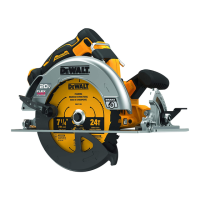13
ENGLISH
WARNING: Always observe the safety instructions and
applicableregulations.
Proper Hand Position(Fig.L)
WARNING: To reduce the risk of serious personal injury,
ALWAYS use proper hand position asshown.
WARNING: To reduce the risk of serious personal
injury, ALWAYS hold securely in anticipation of a
suddenreaction.
Proper hand position requires one hand on the main
handle
26
, with the other hand on the auxiliary handle
12
.
LED Worklight(Fig.A)
The LED worklight
15
is activated when the trigger switch
is depressed.When the trigger is released, the worklight will
stay illuminated for up to 20seconds.
NOTE: The worklight is for lighting the immediate work
surface and is not intended to be used as aflashlight.
Switching On and Off(Fig.E)
For safety reasons the trigger switch
2
of your tool is
equipped with a lock-off button
1
.
Press the lock-off button to unlock thetool.
To run the tool, press the trigger switch
2
.As soon as the
trigger switch is released, the lock-off switch is automatically
activated to prevent unintended starting of themachine.
NOTICE: Do not switch the tool ON or OFF when the
saw blade touches the workpiece or othermaterials.
OPERATION
WARNING: To reduce the risk of serious personal
injury, turn unit off and remove the battery pack
before making any adjustments or removing/
installing attachments or accessories. An
accidental start‑up can causeinjury.
Mounting the Dust Extraction
Port(Fig.A,R)
Your circular saw is supplied with a dust extractionport.
To Install the Dust Extraction Port
1. Fully loosen depth adjustment lever
4
.
2. Place the shoe
5
in the lowestposition.
3. Align the left half of the dust extraction port
29
over
upper blade guard
31
as shown.Be sure to insert the
tab into the casting notch on the tool.When installed
correctly, it will snap fully over the original depth of
cutpointer.
4. Align the right-hand piece
30
with theleft.
5. Insert screws and tightensecurely.
Prior to Operation
• Make sure the guards have been mounted correctly.The
saw blade guard must be in closedposition.
• Make sure the saw blade rotates in the direction of the
arrow on theblade.
• Do not use excessively worn sawblades.
2. Adjust the depth adjustment lever by rotating it in the
desired direction about 1/8 of arevolution.
3. Retightennut.
Bevel Angle Adjustment(Fig.A, I)
The bevel angle adjustment mechanism can be adjusted
between 0° and 57°.
To achieve better accuracy in cutting, use the fine adjustment
markings located on the pivot bracket
21
.
1. Raise the bevel adjustment lever
10
toloosen.
2. Tilt the shoe to the desired angle by aligning the fine
bevel pointer
22
with the desired angle mark on the
pivot bracket
21
.
3. Lower the bevel adjustment lever toretighten.
Bevel Detent(Fig.A, I)
The DCS570 is equipped with a bevel detent feature.As you
tilt the shoe
5
you will hear a click and feel the shoe stop
at both 22.5 and 45 degrees.If either of these is the desired
angle, retighten the lever
10
by lowering it.If you desire
another angle, continue tilting the shoe until the coarse
bevel pointer
23
or the fine pointer
22
aligns with the
desiredmark.
Cut Length Indicator(Fig.A)
The markings on the side of the shoe
5
show the length of
the slot being cut into the material at the full depth of the
cut.The markings are in increments of 5mm.
Kerf Indicator(Fig.K)
The front of the saw shoe has a kerf indicator
9
for vertical
and bevel cutting.This indicator enables you to guide the
saw along cutting lines penciled on the material being
cut.The kerf indicator lines up with the left(outer) side of
the saw blade, which makes the slot or “kerf” cut by the
moving blade fall to the right of the indicator.Guide along
the penciled cutting line so that the kerf falls into the waste
or surplus material.
Mounting and Adjusting the Parallel
Fence(Fig.P)
The parallel fence
28
is used for cutting parallel to the edge
of theworkpiece.
Mounting
1. Slacken the parallel fence adjustment knob
27
to allow
the parallel fence topass.
2. Insert the parallel fence
28
in the shoe asshown.
3. Tighten the parallel fence adjustment knob
27
.
Adjusting
1. Slacken the fence adjustment knob
27
and set the
parallel fence
28
to the desired width.The adjustment
can be read on the parallel fencescale.
2. Tighten the fence adjustment knob
27

